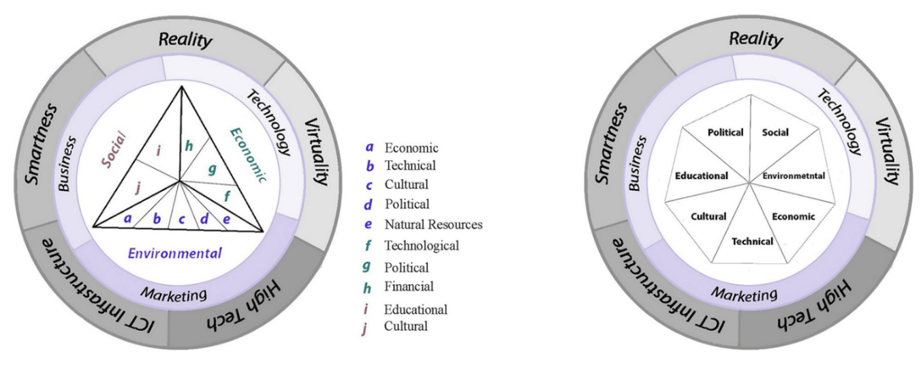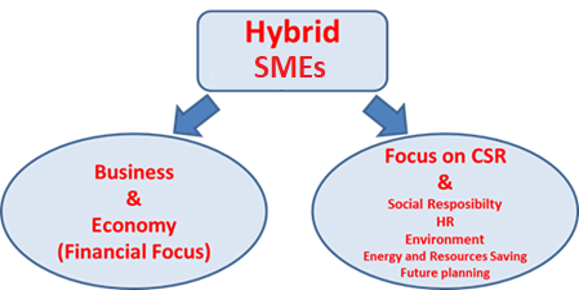Hybrid SMEs' HR Competencies' Requirements for Innovative Technologies
A special issue of Applied System Innovation (ISSN 2571-5577).
Deadline for manuscript submissions: closed (30 June 2021) | Viewed by 1628
Special Issue Editor
Interests: energy management; modeling; blue-green economy; industry 4.0; Internet of Things; Internet of Energy; digitalization; sustainability; international management; vocational training, education, business; CSR; SME management; cultural dimensions; 5th wave theory/tomorrow age; future studies
Special Issues, Collections and Topics in MDPI journals
Special Issue Information
Dear Colleagues,
New trends in Hybrid SMEs’ HR Competencies’ Requirements for Innovative Technologies are about eleven sustainable development goals and i-Sustainability Plus theory [invented by: Prof. Dr. Dr. h.c. Hamid Doost Mohammadian-2019] which is combination of innovation, sustainability and digitalization technologies.
Technology development creates new opportunities for business improvement. IoT, cyber-physical systems, hybrid SMEs, HR competencies identifier systems, big data, machine learning, ubiquitous and AI are new innovative techniques used in the I4.0 that enable SMEs to better manage resources and provide them with flexibility to respond to the business conditions.
Based on this theory, hybrid SMEs that are concerned on business and marketing, social responsibility like CSR strategies, being environmentally friendly could improve quality of livability and life. Basically, innovative technologies are created under restrictions in order to struggle with them through altering risks and challenges as new opportunities by manage HR competencies.
In this theory, innovative management is about innovation in business, marketing and technology systems to gain successfulness and the best result. Innovation has an important role in not only business innovation model and marketing innovation, but also in whole processes of an organization. Accordingly, technology innovation is realized as a separate segment of innovative management in sustainability plus theory.
Technological innovation is related to creating new ideas based on technology or utilizing knowledge to find out innovative and new solutions to improve processes and situation of organization. In particular, new technologies such as digitalization, IT, IoT and etc., influence on innovative processes. The most important advantages of new technology are:
- Accelerating innovative processes;
- Realizing new chances in markets and HR competencies;
- Creating new ideas and using them into innovations;
- Modeling products and services into market to test them in order to find out new results;
- Developing businesses with maximum profit and effectiveness.
In this Special Issue, the role of technological innovation management and education in I4.0 and their impacts on HR competencies are investigated. It is important to make these innovative technologies simple and user friendly for the HR and public sector for facing tomorrow’s shocks in the business sector.
Generally, these innovative technologies such as IoT, digitalization and smartness could serve as tools and motivation to improve HR competencies towards modern hybrid SMEs; like SMEs in I4.0 (SME 4.0) that are able to participate, compete, and survive in markets as well as cultivate sustainable development.
The 5th theory founded on HR education/training and utilizing high technology in businesses is a path to create modern innovative sustainable hybrid SMEs concerned with CSR strategies, environmental sustainability, and sustainable development, as well as successful business that is able to conquer future concerns towards a more sustainable and livable world by balancing between CSR ad business economy.
As we are living in the 4th wave based on innovative technologies (I4.0 and Society 5.0) and get ready for the 5th wave (invented by Prof. Dr. Dr. h.c. Hamid Doost Mohammadian, 2017–19) and edge of tomorrow, high innovative technologies like digitalization and ubiquitous would play role in achieving i- Sustainability Plus theory.
Digitalization and ubiquitous concept could be used as tools to improve high sustainability and innovative management. In general, high technologies are changing the processes and their results in these days. So, it is vital to be utilized in new policies, strategies and theories as fundamental techniques. Therefore, in this theory authors use digitalization and ubiquitous concept as one of the main pillars.
i-Sustainability plus is integration of high sustainability, innovative management and digitalization in order to gain the best results, effectiveness and profits. The below figure presents this theory:

i- Sustainability Plus Theory [invented by: Prof. Dr. Dr. h.c. Hamid Doost Mohammadian-2019].
Based on the latest research, many devices and equipment that are needed in the implementation of innovative technologies are now ready, but surprisingly, although a small percentage of SMEs are taking advantage of the technologies’ capabilities towards successful SMEs with high productivity, research shows a poor growth of innovative technologies in SMEs due to the lack of sufficient knowledge and skills in the HR to apply the relevant techniques.
Identifying and defining the competencies required to utilize these technologies and incorporate them into job competencies along with appropriate planning for HRD is one of the essentials of today’s business.
These devices are now available; although, a small percentage of SMEs are taking privileges of the technologies' capabilities towards successful hybrid SMEs with high productivity. These researches show, poor growth of innovation in SMEs is due to the lack of sufficient knowledge and skills in the HR to apply the relevant techniques. Identifying and defining the competencies required to utilize these technologies and incorporate it into job competencies along with appropriate planning for HRD is one of the essentials of today's business.
These theories founded on HR education/training and utilizing high innovative technologies in business is a path to create modern innovative hybrid SMEs concerned on CSR strategies, environmental sustainability and sustainable development as well as successful business that are able to conquer future concerns towards more sustainable and livable World by balancing between CSR & business economy.

Hybrid SMEs [Prof. Dr. Hamid Doost Mohammadian, 2019].
SMEs need to reconcile their economic goals with environmental and social targets. This Special Issue welcomes both conceptual and empirical contributions that may help to evaluate the relationships, the complementarities and the trade-offs along these seven pillars and three dimensions.
Authors from different disciplines such as business, economics, technology, HR competencies, social, engineering, training, energy, culture and other related disciplines are invited to submit their papers.
Multidisciplinary research that embraces the diversity of hybrid SMEs’ HR competencies’ Requirements for Innovative Technologies are particularly appreciated.
In particular, the topic of interest includes but is not limited to:
- The role of innovative technologies and Internet of Business (IoB) in the 5th wave theory readiness & its effect on hybrid SME 4.0 HR competencies;
- Hybrid SMEs’ HR competencies’ requirements for innovative technologies practices, SME reputation and financial performances;
- Role of innovative technologies in SME 4.0 and its effect on HR competencies;
- Innovative technologies and I4.0 – Readiness check for SMEs’ HR competencies;
- Digital practices in CSR with a focus on hybrid SMEs’ HR competencies;
- Hybrid SMEs’ HR competencies’ requirements for innovative technologies and tomorrow shocks readiness;
- Legal aspects of hybrid SMEs’ HR competencies’ requirements for innovative technologies;
- Cost efficiency measurement in hybrid SMEs’ innovative technologies and its effect on HR competencies;
- Best practices in Hybrid SMEs’ HR competencies’ requirements for innovative technologies;
- SMEs’ HR cultural competencies’ requirements for sustainable mobility management;
- SMEs’ HR cultural competencies’ requirements for innovative technology management;
- Working with consumers to improve HR cultural competencies’ requirements;
- Innovative technologies make waste as energy resource;
- Impact of illegal technologies management practices technologies and giving sustainable services;
- Innovative practices in hybrid SMEs’ HR competencies management;
- Digital practices in HRD management with a focus on hybrid SMEs’ HR competencies.
Prof. Dr. Hamid Doost Mohammadian
Guest Editor
Manuscript Submission Information
Manuscripts should be submitted online at www.mdpi.com by registering and logging in to this website. Once you are registered, click here to go to the submission form. Manuscripts can be submitted until the deadline. All submissions that pass pre-check are peer-reviewed. Accepted papers will be published continuously in the journal (as soon as accepted) and will be listed together on the special issue website. Research articles, review articles as well as short communications are invited. For planned papers, a title and short abstract (about 250 words) can be sent to the Editorial Office for assessment.
Submitted manuscripts should not have been published previously, nor be under consideration for publication elsewhere (except conference proceedings papers). All manuscripts are thoroughly refereed through a single-blind peer-review process. A guide for authors and other relevant information for submission of manuscripts is available on the Instructions for Authors page. Applied System Innovation is an international peer-reviewed open access semimonthly journal published by MDPI.
Please visit the Instructions for Authors page before submitting a manuscript. The Article Processing Charge (APC) for publication in this open access journal is 1600 CHF (Swiss Francs). Submitted papers should be well formatted and use good English. Authors may use MDPI's English editing service prior to publication or during author revisions.
Keywords
- innovation
- risk management
- hybrid SMEs
- sustainability
- sustainable development
- high technologies
- human resources
- CSR
- the 5th wave theory
- future shocks readiness
- HR competencies
- innovative technologies
- global challenges
- hybrid companies
- IoT (Internet of Things)
- IoB (Internet of Business)
- IoE (Internet of Energy)
- SMEs management
- sustainable HR digitalization and digital transformation
- I4.0
- Society 5.0
- building and construction
- HRM
Benefits of Publishing in a Special Issue
- Ease of navigation: Grouping papers by topic helps scholars navigate broad scope journals more efficiently.
- Greater discoverability: Special Issues support the reach and impact of scientific research. Articles in Special Issues are more discoverable and cited more frequently.
- Expansion of research network: Special Issues facilitate connections among authors, fostering scientific collaborations.
- External promotion: Articles in Special Issues are often promoted through the journal's social media, increasing their visibility.
- Reprint: MDPI Books provides the opportunity to republish successful Special Issues in book format, both online and in print.
Further information on MDPI's Special Issue policies can be found here.





